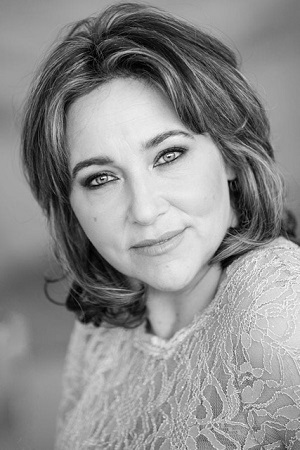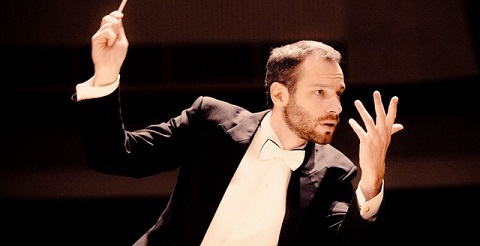Recently in Reviews
English Touring Opera are delighted to announce a season of lyric monodramas to tour nationally from October to December. The season features music for solo singer and piano by Argento, Britten, Tippett and Shostakovich with a bold and inventive approach to making opera during social distancing.
This tenth of ten Live from London concerts was in fact a recorded live performance from California. It was no less enjoyable for that, and it was also uplifting to learn that this wasn’t in fact the ‘last’ LfL event that we will be able to enjoy, courtesy of VOCES8 and their fellow vocal ensembles (more below …).
Ever since Wigmore Hall announced their superb series of autumn concerts, all streamed live and available free of charge, I’d been looking forward to this song recital by Ian Bostridge and Imogen Cooper.
The Sixteen continues its exploration of Henry Purcell’s Welcome Songs for Charles II. As with Robert King’s pioneering Purcell series begun over thirty years ago for Hyperion, Harry Christophers is recording two Welcome Songs per disc.
Although Stile Antico’s programme article for their Live from London recital introduced their selection from the many treasures of the English Renaissance in the context of the theological debates and upheavals of the Tudor and Elizabethan years, their performance was more evocative of private chamber music than of public liturgy.
In February this year, Albanian soprano Ermonela Jaho made a highly lauded debut recital at Wigmore Hall - a concert which both celebrated Opera Rara’s 50th anniversary and honoured the career of the Italian soprano Rosina Storchio (1872-1945), the star of verismo who created the title roles in Leoncavallo’s La bohème and Zazà, Mascagni’s Lodoletta and Puccini’s Madama Butterfly.
Evidently, face masks don’t stifle appreciative “Bravo!”s. And, reducing audience numbers doesn’t lower the volume of such acclamations. For, the audience at Wigmore Hall gave soprano Elizabeth Llewellyn and pianist Simon Lepper a greatly deserved warm reception and hearty response following this lunchtime recital of late-Romantic song.
Collapsology. Or, perhaps we should use the French word ‘Collapsologie’ because this is a transdisciplinary idea pretty much advocated by a series of French theorists - and apparently, mostly French theorists. It in essence focuses on the imminent collapse of modern society and all its layers - a series of escalating crises on a global scale: environmental, economic, geopolitical, governmental; the list is extensive.
For this week’s Live from London vocal recital we moved from the home of VOCES8, St Anne and St Agnes in the City of London, to Kings Place, where The Sixteen - who have been associate artists at the venue for some time - presented a programme of music and words bound together by the theme of ‘reflection’.
'Such is your divine Disposation that both you excellently understand, and royally entertaine the Exercise of Musicke.’
Amongst an avalanche of new Mahler recordings appearing at the moment (Das Lied von der Erde seems to be the most favoured, with three) this 1991 Mahler Second from the 2nd Kassel MahlerFest is one of the more interesting releases.
‘And there was war in heaven: Michael and his angels fought against the dragon; and the dragon fought and his angels, And prevailed not; neither was their place found any more in heaven … that old serpent … Satan, which deceiveth the whole world: he was cast out into the earth, and his angels were cast out with him.’
If there is one myth, it seems believed by some people today, that probably needs shattering it is that post-war recordings or performances of Wagner operas were always of exceptional quality. This 1949 Hamburg Tristan und Isolde is one of those recordings - though quite who is to blame for its many problems takes quite some unearthing.
There was never any doubt that the fifth of the twelve Met Stars Live in Concert broadcasts was going to be a palpably intense and vivid event, as well as a musically stunning and theatrically enervating experience.
‘Love’ was the theme for this Live from London performance by Apollo5. Given the complexity and diversity of that human emotion, and Apollo5’s reputation for versatility and diverse repertoire, ranging from Renaissance choral music to jazz, from contemporary classical works to popular song, it was no surprise that their programme spanned 500 years and several musical styles.
The Academy of St Martin in the Fields have titled their autumn series of eight concerts - which are taking place at 5pm and 7.30pm on two Saturdays each month at their home venue in Trafalgar Square, and being filmed for streaming the following Thursday - ‘re:connect’.
The London Symphony Orchestra opened their Autumn 2020 season with a homage to Oliver Knussen, who died at the age of 66 in July 2018. The programme traced a national musical lineage through the twentieth century, from Britten to Knussen, on to Mark-Anthony Turnage, and entwining the LSO and Rattle too.
With the Live from London digital vocal festival entering the second half of the series, the festival’s host, VOCES8, returned to their home at St Annes and St Agnes in the City of London to present a sequence of ‘Choral Dances’ - vocal music inspired by dance, embracing diverse genres from the Renaissance madrigal to swing jazz.
Just a few unison string wriggles from the opening of Mozart’s overture to Le nozze di Figaro are enough to make any opera-lover perch on the edge of their seat, in excited anticipation of the drama in music to come, so there could be no other curtain-raiser for this Gala Concert at the Royal Opera House, the latest instalment from ‘their House’ to ‘our houses’.
"Before the ending of the day, creator of all things, we pray that, with your accustomed mercy, you may watch over us."
Reviews

23 Feb 2020
Three Centuries Collide: Widmann, Ravel and Beethoven
It’s very rare that you go to a concert and your expectation of it is completely turned on its head. This was one of those. Three works, each composed exactly a century apart, beginning and ending with performances of such clarity and brilliance.
We began this journey through time in 2003 with Jörg Widmann’s Lied for Orchestra. This is a piece centred on melody - and
centred on Schubert. It is a work of profound extremes, with an orchestra
that is like a Schubert lieder but without being the accompaniment
to it. The tenor of the music is indeed more resonant of Schubert than
Widmann’s style normally suggests, and if there is a focus on song in this
piece it is generated by the orchestra responding to the intimacy of the
instrumentation of a piece like the Octet with instruments characterised by
instrumental solos replicating their orchestral voices. But, what is also
noticeable is what is not Schubert. The debt to Sibelius - especially that
composer’s Seventh Symphony - shines like a floodlight. Even more apparent
is Mahler’s Tenth Symphony, especially the final movement. The use of the
bassoon suggests all its lugubriousness, but it’s the intensity of the
string writing, the swelling violins and dark strings which seem just as
searing in that movement’s terrifying climax; a trio of trombones has all
the effect of overloaded power, the crushing percussion a hammer blow. The
work may travel through styles but it’s musically effective and the London
Philharmonic played it superbly.
Wind back a century to 1903 and we were in the world of evocative song and
ravishing orchestration - Ravel’s Shéhérazade. This was, in many
ways, not an ideal performance but Ravel does not make life particularly
easy for any mezzo who attempts to sing the part. Christine Rice lacked a
certain precision in her French which was magnified, certainly by this
particular orchestra. When Juliette Bausor’s principal flute sounded so
impeccably shaped, with a tone exquisitely given to stretch her lines into
infinity, Rice’s clipping of phrases and tendency to muzzle the distinctive
clarity of what she was singing came across as less than accurate.
But that is not to say that her voice itself is often a beautiful
instrument. Its very depth and sheen can often give the impression of
conveying mystery, although what we got was principally an illusion of it.
That long first song, ‘Asie’, should be a melding of two worlds - one of
beauty the other of horror; but listening to Rice’s version I’m not sure I
got this. There didn’t seem much of either mystery or solitariness in the
line “Mystérieuse et solitaire”, nor the distinction between “des rose et
du sang” towards the songs close. The panache of the London Philharmonic’s
Spanish-inflected rhythms, its oriental shades of Eastern promise were
highly expressive but simply highlighted the struggle many singers
experience in this cycle.
There are difficulties in the two shorter songs, though I think Rice
managed them slightly better. ‘La flute enchantée’ needs to strike a
balance between sorrow and joy and that is largely what we got with Rice
able to bring a mellowness and sense of radiance to her voice.
‘L’indifférent’ is complex in that it can take a mezzo outside her comfort
zone - some find the characterisation of its androgyny difficult to
navigate; others embrace it. Rice leaned towards the latter, but
principally because the voice’s darker more masculine tones hinted at her
ambiguity.
 Dima Slobodeniouk. Photo credit: Marco Borggreve.
Dima Slobodeniouk. Photo credit: Marco Borggreve.
The concert ended in 1803, as it were, with Beethoven’s Eroica.
Despite this symphony being an indisputable masterpiece, it never surprises
me how many performances of it hang fire. This, however, was one of the
most incendiary I have heard in many, many years. I have yet to mention the
conductor of this concert, Dima Slobodeniouk. He is not the most precise
conductor I have seen, but what he does do is shape what he conducts with
great integrity and vision. The gestures are broad in scope as he sweeps
his left hand deep into the orchestra. But what is most impressive is that
magical illusion of making what he conducts seem much faster than it
actually is. The Allegro con brio of this Eroica sounded
quite measured but the sheer electricity generated was absolutely
thrilling. There was no broadness in those opening chords, so I suppose one
might have expected a certain fleetness - but it wasn’t immediately
apparent we would get it.
The Marcia Funebre, on the other hand, seemed to work in the
opposite direction. This was fast, and there was never any sense it was
otherwise. Perhaps the F minor Fugue didn’t quite have sufficient power for
my taste, but Slobodeniouk managed to pull some depth from the LPO’s cellos
and basses which did at least suggest gravity and that plunge into the
turbulent and ferocious development was a thrilling cataclysm of despair. I
think one might have preferred divided violins and a different layout of
lower strings, but we had what we had.
The brilliance of this performance’s Scherzo was entirely down to
the lightness of touch from the orchestra, something which was carried
through to the Allegro molto - its storms, fugues, sforzandos and
wildly fluctuating dynamics articulated with uncompromising brilliance. A
revelatory performance, and one which bookended an often fascinating
concert.
Marc Bridle
Christine Rice (mezzo-soprano), Dima Slobodeniouk (conductor), London
Philharmonic Orchestra
Royal Festival Hall, London; Saturday 22nd February 2020.

